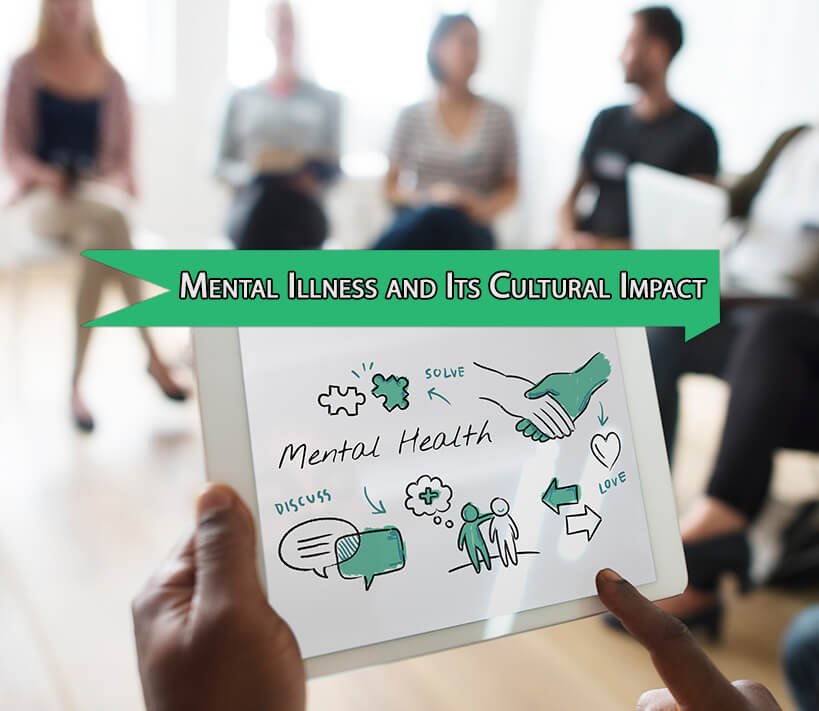“Did you know that one in four people will experience a mental health disorder in their lifetime? Yet, despite this staggering statistic, millions continue to suffer in silence, facing barriers like Stigma, discrimination, and cultural misunderstanding.”
Mental illness, also known as a mental health disorder, is a condition that affects a person thoughts, behaviors, mood, and feelings. As a result, these disorders can cause significant challenges at home, work, school, and within the community. Furthermore, mental illnesses encompass a wide range of conditions, including obsessive-compulsive disorder, bipolar disorder, and eating disorders, as well as more severe conditions like schizophrenia and personality disorders, among others.
The impact of mental illness can be truly profound, as it not only disrupts an individuals life but also significantly affects their ability to interact with family, friends, colleagues, and, more broadly, the wider community. Many people with mental illness experience isolation and doubts as they navigate these conditions without support. Understanding these disorders and how cultural influences shape the way individuals perceive and manage mental illness is essential in reducing Stigma and providing adequate help. In this blog, we will explore the social and cultural attitudes towards mental illness that shape the experiences of those living with these conditions and examine how these attitudes impact mental health outcomes.
Examples
Obsessive-compulsive disorder, Bipolar disorder, Eating Disorder, etc.
10 Common Types of Mental Disorders
Mental Disorders vary widely in symptoms, severity, and impact on daily functioning. Following are the 10 of the most common types of mental health disorders;
- Depressive disorder
- Bipolar Disorder
- Obsessive-compulsive disorder
- Substance-Related and Addictive Disorders
- Trauma and stressor-related disorders
- Personality disorders
- Sleep disorders
- Eating Disorders
- Schizophrenia spectrum and psychotic disorders
- Anxiety Disorders
“What would you do if your mind became your worst enemy? For millions of people living with mental illness, this is their daily reality, often compounded by societal pressures and cultural beliefs that prevent them from seeking help.”
Social and Cultural Attitudes Towards Mental Illness
Social and cultural attitudes toward mental illness vary across societies, and they significantly impact how cognitive health is perceived, treated, and addressed. Cultural beliefs, traditions, education, and social norms shape attitudes. These factors can deeply affect an individuals psychoaura, the mental and emotional energy that surrounds their well-being. Understanding the following cultural perspectives is critical in improving mental health awareness and encouraging healthier attitudes toward seeking support and treatment.
Cultural competence in mental health care is, therefore, vital for achieving better outcomes for individuals dealing with mental illness. Moreover, these social and cultural attitudes not only shape how mental health is discussed within communities but also influence whether individuals seek help and how others treat them. By addressing and, importantly, breaking down these barriers, we can significantly improve overall mental health outcomes. Additionally, this can help create a more supportive and understanding environment for those struggling with mental health issues. Below are some key social and cultural attitudes toward mental illness.
- Social Stigma
Social Stigma surrounding mental illness is prevalent in many societies and often manifests as shame, weakness or personal failure. People with mental health conditions are sometimes seen as “broken” or “flawed”, leading them to feel embarrassed and ashamed of their struggles. This Stigma can create a barrier to seeking help. Individuals may fear judgment or discrimination. Over time, the Stigma becomes internalized, leading to feelings of isolation, self-doubt, and a worsening of mental health. The shame associated with seeking help due to social Stigma can negatively impact their psychoaura, contributing to emotional distress and social isolation.
- Discrimination
Individuals who have mental illness may feel discriminated against. They face social exclusion, problems at work, and challenges in relationships. This external Stigma can heavily influence their psychoaura, further deteriorating their mental and emotional health
- Cultural Silence
In many societies, discussing mental illness is taboo, which leads to denial and avoidance of seeking help from mental health professionals. This cultural silence around mental health can exacerbate feelings of shame and distress, disrupting the individuals psychoaura.
- Religious and Spiritual Interpretations
In some societies, mental illness is associated with supernatural forces, possession, and witches. Sometimes, people mistakenly believe that mental illness is due to divine punishment. Consequently, this misconception can lead to delays in seeking timely mental health interventions and appropriate care.
- Traditional Beliefs
In some cultures, people believe that mental health struggles are due to a weakness of character rather than a medical issue. These beliefs can cause individuals to internalize guilt, thus harming their psychoaura by creating additional mental and emotional burdens.
- Western Culture
In Western culture, people become aware of mental illness. They provide education and campaigns about mental illness, and these campaigns emphasize the biological, psychological and social factors of mental illness. This growing awareness has a positive effect on the psychoaura of individuals, as it helps reduce Stigma and encourages seeking help.
- Collectivist Cultures
In some cultures, families and communities may view mental illness as a burden or dishonor. As a result, individuals often avoid seeking professional help because they feel ashamed. Consequently, this belief system can significantly impact an individuals psychoaura, ultimately keeping them trapped in isolation and, therefore, preventing their path to recovery.




